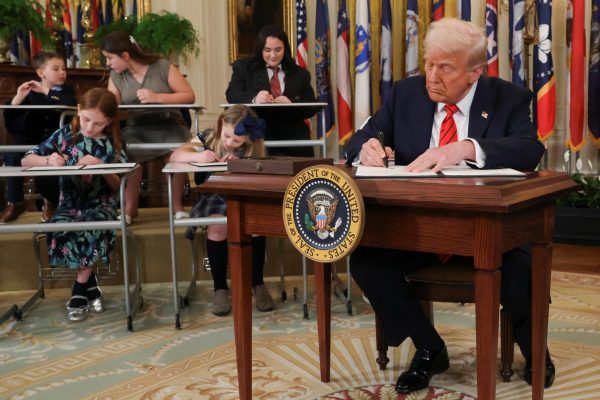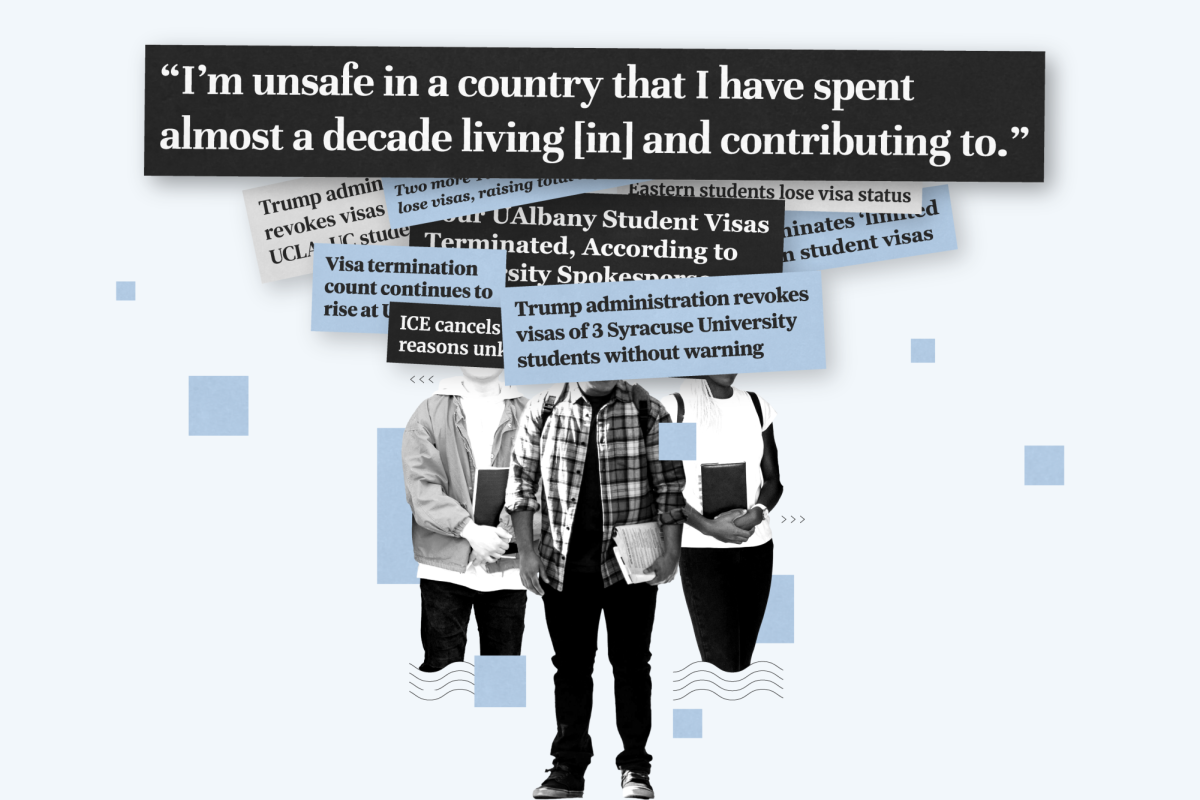Editor’s note: All international student sources are referred to using their initials to preserve their safety and wellbeing.
JP, an international student at Ithaca College, was planning to begin work in the U.S. after graduation in May and make steps toward a green card. But JP’s post-grad plans are not turning out how she thought they would. Since January, the federal government has made aggressive moves to push international students out of the country.
“I’m unsafe in a country that I have spent almost a decade living [in] and contributing to,” JP said. “I built a life here, and I do everything by the books. … Now, I don’t want to be here. If I’m going to be suffering, I might as well suffer in the comfort of my home.”
No international students at Ithaca College have had their status or visa terminated in 2025, according to Emily Rockett, vice president, general counsel and secretary to the Board of Trustees. However, the college’s international students have anxiously watched President Donald Trump’s administration revoke the legal status of more than 4,700 international students at other higher education institutions since his inauguration Jan. 20. Following significant pushback in court, the administration announced April 25 that legal status would be restored for some students who had their status terminated but did not have their visa revoked, and a new system for reviewing and terminating legal statuses will be developed.
ST, an Ithaca College international student from Belarus, a country she described as politically unstable and unsafe, said the frequent changes in policy have made everyday tasks feel dangerous.
“Before, it was clear what you can do, what you cannot do,” ST said. “[I’m] really paranoid about it, because you feel like anything can become a reason [to be deported]. … Sometimes you’re just scared to move.”
A spokesperson for the Department of Homeland Security told ABC News that no visa revocations would be reversed. Attorney Charles Kuck representing 133 students in a class-action lawsuit reported that other clients of his had their status restored without a court order. It is unclear how many statuses will be restored and within what timeline.
Jonathan Grode — U.S. practice director and managing partner of Green and Spiegel, an immigration law firm — said that while the litigation against the government appears to be succeeding, the attack on students has done what it intended to do.
“The chaos is by design,” Grode said. “Sometimes the best way to control the many is to dramatically affect the few. The confidence and the ability to have student visas and be able to to be here and get an education has been impacted. The protests are being diminished. The effect has occurred. The result of litigation certainly has merit and matters. But do you see protests at universities like we had last spring? … Even though people prevail in court doesn’t mean they’ve necessarily won.”
Ithaca College international student resources
Rockett said International Student and Scholar Services provides support to students, and the college would try to provide referrals, but it does not give individual legal services. The college has been hosting frequent sessions for international students to know their rights, including a meeting with an immigration lawyer.
Diana Dimitrova, director of International Student and Scholar Services, declined The Ithacan’s interview request.
President La Jerne Cornish told The Ithacan that she would like to offer international undergraduate, graduate and recently graduated students summer housing using the Student Emergency Relief Fund in cases where students are concerned about not being permitted reentry to the U.S. or cannot go home for the summer for other reasons. On April 24 and 25, SERF collected $16,030 from 38 donors, including $5,000 from Cornish. The IC International Club also raised funds to support international students, collecting $75 from two donors on Giving Day.
“I’m concerned, like everybody else in the country, about rights being taken,” Cornish said. “I just encourage our students to be mindful about where they are at all times and really to be mindful about what they say, because you don’t know who’s listening. … We aren’t doing anything public because we don’t want to put anybody in harm’s way. … We want to keep the identities of those who are the most afraid and the most vulnerable as private as we possibly can.”
AC, an international student studying politics at IC, said there has been no communication from the college to students about summer housing being subsidized. He said he finds that strange because there have been consistent emails from the International Office about travel documentation and other information. He also said he does not fully understand the decision not to make a public statement, and if there is concern, they should just use the international student email list.
“Saying that you don’t want to shine the spotlight on [international students] when the spotlight has already been shining on them is, I think, a weak excuse,” AC said.
While Ithaca College students have not had any status changes, Cornell University graduate student Momodou Taal’s visa was revoked in March after he participated in pro-Palestinian protests on campus. According to a Cornell University spokesperson, in the last several weeks, nine current Cornell students have had their SEVIS status terminated by federal authorities, of which three also had their visas revoked. There were eight Cornell alumni who also had their status terminated. Cornell’s International Services Office released a statement April 10 with information about the DHS’ revocation of students’ legal statuses, advice and resources, including free legal consultations.
Difference between legal status and visas
The Student and Exchange Visitor Information System (SEVIS) is a database of approximately 1.1 million foreign students’ records maintained by individual schools and overseen by U.S. Immigration and Customs Enforcement. SEVIS tracks students’ adherence to status requirements, as well as school disciplinary actions and criminal charges. Typical reasons for SEVIS termination are working without authorization or dropping below the required course load, which is 12 credits for undergraduate students. SEVIS termination, or termination of legal status, ends a student’s ability to remain in the U.S. and puts them at risk of being deported.
“There was no notice or opportunity to defend the loss of status,” Grode said. “That’s why these litigations are being successful, because you have a right to defend yourself, and they weren’t given that right.”
If a visa is revoked, the cardholder must go abroad to process a new visa before they can return. However, a visa permits an individual to enter a country, meaning the cardholder can remain in the U.S. on an expired or terminated visa but cannot re-enter.
“If you have a revoked visa, you don’t have to leave, you don’t have to be in a hurry,” Grode said. “I don’t think they would have gotten much pushback if they were [just revoking visas]. People might not have liked it, but it would have been their prerogative. They took a step too far and started to cancel the status.”
Grode said the lawsuits are arguing that there was no legal basis for terminating students’ statuses. He said status revocation typically does not come from the government; it comes from the school that controls the SEVIS record. Grode said it is unclear why the government encroached on a decision usually managed by schools.
“The answers from the government have been all over the place,” Grode said. “It seems like they didn’t fully recognize the effect of what they were doing when they took this additional step beyond visa revocation.”
Activism and visa/status termination
Global attention has been drawn to the students who had their status or visa revoked because of activism like expressing support for Palestine or opposing Israel. Some visas have been terminated based on a seldom used provision that allows the secretary of state “under certain circumstances” to deny entry or terminate a visa if an “applicant whose entry or proposed activities in the United States would have potentially serious adverse foreign policy consequences for the United States.” A majority of the status and visa terminations were not regarding student activism.
Visa holders are protected by the First Amendment. However, Grode said that having the right to free speech does not protect a visa holder from having their visa revoked because of their speech.
“[Visa holders] have a right to free speech, but don’t have a right to a visa — the visa is a privilege,” Grode said.
NB, an Ithaca College international student, said that while she normally would take part in or help organize protests, she has felt the need to lay low.
“I feel like I have to just be quiet,” NB said. “I am not existing, the way that I … would talk if everything was not happening. With everything going on, it’s like a constant reminder that you feel like the other.”
On April 9, U.S. Citizenship and Immigration Services released a statement that, effective immediately, the USCIS would begin considering antisemitism in non-citizens’ social media activity and the physical harassment of Jewish individuals as precedent for denying them temporary or permanent residence in the U.S. The statement said the new policy will affect “aliens applying for lawful permanent resident status, foreign students and aliens affiliated with educational institutions linked to antisemitic activity.”
“There is no room in the United States for the rest of the world’s terrorist sympathizers, and we are under no obligation to admit them or let them stay here,” said DHS Assistant Secretary for Public Affairs Tricia McLaughlin in the statement. “Sec. Noem has made it clear that anyone who thinks they can come to America and hide behind the First Amendment to advocate for anti-Semitic violence and terrorism – think again. You are not welcome here.”
Reversal of SEVIS terminations
In an email submitted in federal court, U.S. Attorney Mark Sauter told Brad Banias, a lawyer representing some international students whose statuses were revoked, that some SEVIS records were being restored.
“ICE is developing a policy that will provide a framework for SEVIS record terminations,” Banias wrote in the email. “Until such a policy is issued, the SEVIS records for plaintiff(s) in this case (and other similarly situated plaintiffs) will remain Active or shall be re-activated if not currently active and ICE will not modify the record solely based on the NCIC finding that resulted in the recent SEVIS record termination.”
More than 100 lawsuits have been filed against the Trump administration, but the exact number is unclear. Grode said that fighting the massive amounts of litigation was not worth the resources for the administration.
“The government has to say something to placate judges so that they have an opportunity of removing the suits,” Grode said. “This is a way for the government to adhere to what would probably become a judicial order, to seem proactive, even though it is a reactive posture, with the hopes of curtailing future litigation. What this means practically, and the best analogy I could give you is, we’ve seen the Trump administration operate as a government of sledgehammers, and now they’re being asked to take a scalpel.”
Federal government encroachment on higher ed
Beyond individual students having their status terminated, the federal administration has also threatened to pull Harvard University’s eligibility to host international students because the university refused federal demands to make policy changes.
“I think this is more like a tool the government is using in its ongoing fight with Harvard,” Grode said. “Whether or not that plays out is something to be seen. That said, I do think we have to be mindful of the fact that they are going after the schools. They are going after their ability to issue student visas, and to think that they won’t take away that ability and let it play out in the courts the way they have with the student visa situation itself is erroneous. These people are looking at reasons for curtailing the activities of these universities.”

Harvard — which had $2 billion in federal funding frozen — is among more than a dozen elite universities to have federal funding pulled. Trump also signed an executive order in March to begin dismantling the U.S. Department of Education. In response to the Trump administration’s interference in higher education, more than 500 institutions have co-signed a statement in protest, including Ithaca College, Cornell and Harvard.
“We’re going to continue to live our values and lean into our values, unless and until we cannot,” Cornish said in regard to signing the statement. “We will comply with the law, but today, we are not breaking any laws and so when there’s a law, we will comply with it.”
















